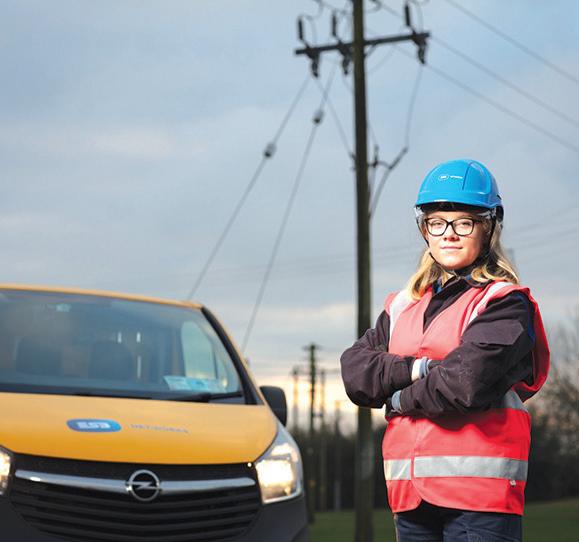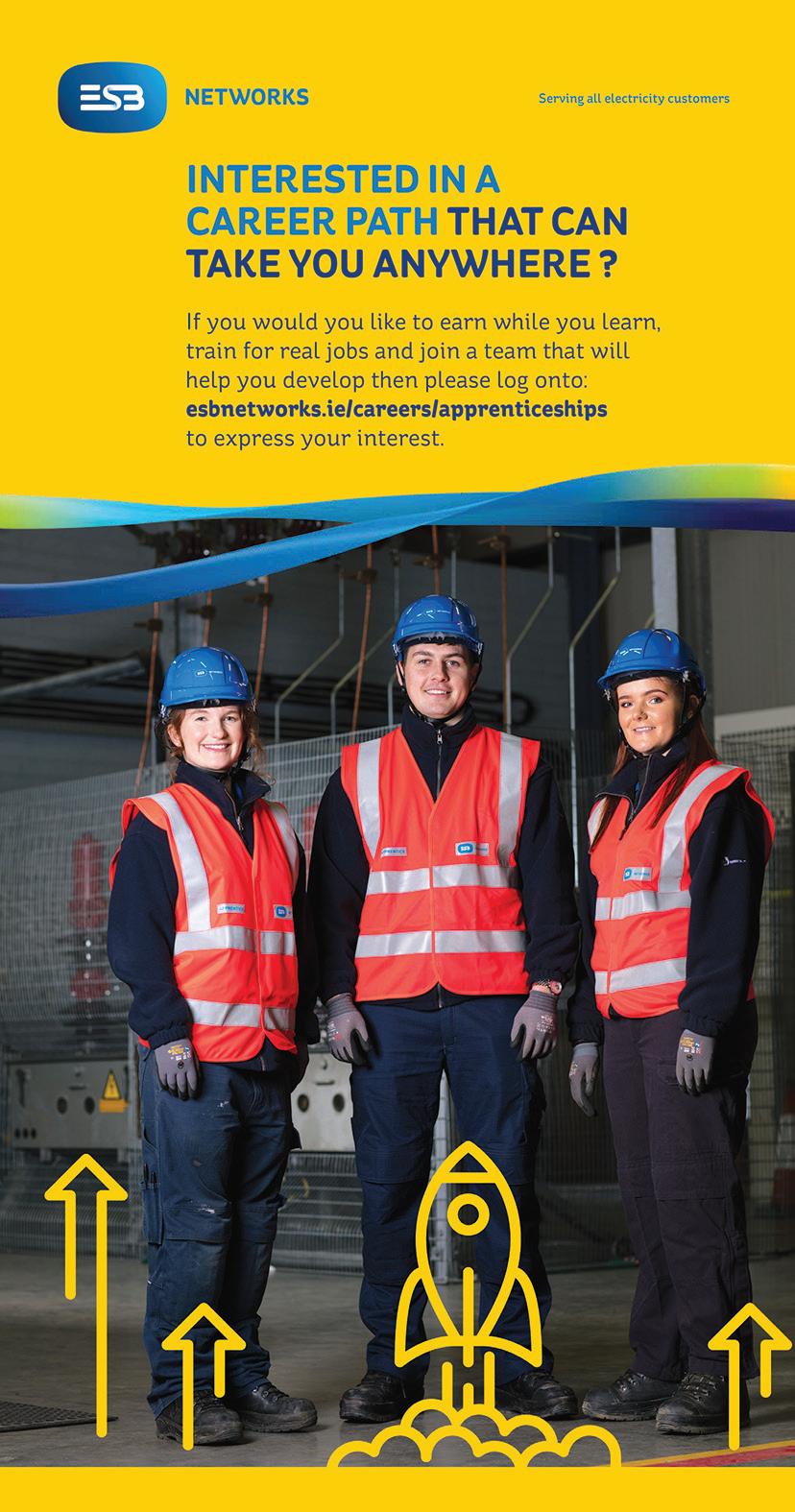
8 minute read
See your career going places with the ESB Networks Apprenticeship Programme
ESB Networks have recruited over 300 apprentices since 2016. We will be recruiting up to 48 apprentices across the country again in February 2021 for our programme starting in September 2021.
Our programme will be open for applicants from mid-February 2021 at www.esbnetworks.ie/careers/ apprenticeships. There are a number of interesting Apprentice Videos on our website also that will give you an idea of the type of work our Apprentice Networks Technician (Electricians) are involved in on a day to day basis.
Advertisement
High level of interest
The 2020 ESB Networks Apprenticeship Programme recruitment campaign received over 6,000 applications, highlighting the level of interest in the programme and a career that is both diverse and challenging.
As an Apprentice Network Technician (Electrician), recruits receive on the job training, working as part of front-line teams, as well as classroom-based learning. Apprentices benefit from varied work experience, working indoors and outdoors, and learning about technology, customer service, and delivering results under pressure. They learn a variety of electrical and practical skills and, upon completion of the programme obtain a QQI Advanced Level 6 Electrical Trade Certificate.
Seven phases
The ESB Networks Electrical Apprenticeship is SOLAS standardsbased, consisting of 208 weeks over four years. During this time, there are seven SOLAS phases and ESB Networks off job training, including phases 1, 3, 5 and 7 are on the job, working closely with a qualified Network Technician on varied sites across ESB Networks.
The SOLAS phases 2, 4 and 6 consist of off-the-job training modules, with phases in a SOLAS Training Centre and one of the IT Colleges around the country. Finally, there are 24 weeks of ESB Networks
"Having completed the four-year programme, apprentices will have gained experience working with a leading utility company" "A critical part of the Programme is the training and peer support given to the apprentices"
off the job training which takes place in the ESB Networks Training Centre, Portlaoise.
Having completed the four-year programme, apprentices will have gained experience working with a leading utility company. ESB Networks serves 2.3 million customers in Ireland, providing a safe and reliable electricity supply to homes, businesses and communities throughout the country - ESB Networks apprentices play an important part in delivering this service.
Role combines both physical and logical
Customer service is at the heart of ESB Networks, through their experience, ESB Networks apprentices will be at the fore in delivering and providing services to our customers. Though the job requires an element of physicality, there is much more to the programme than climbing poles and heavy lifting, the role combines both physical and logical activity.
True to the fact that no two days are the same in the programme,
How to apply
For those, who are interested in becoming an ESB Networks Apprenticeship, the programme will open to applicants in February 2021.
All Interviews will take place from the middle of April to the Middle of May. With offers been made the last week in July/ first week in August. All new recruits will start their apprentices with ESB Network in late August / early September 2021. The programme is open to individuals over 16 years of age on 1st June 2021.
At the time of application, candidates must have obtained the following minimum educational qualifications:
Junior Certificate (Ordinary Level)
Grade C or higher at Ordinary Level (or Grade D or higher at Higher Level) in the Junior Certificate (or equivalent) in the following subjects: 1) Irish or English 2) Mathematics 3) Science* 4) Any 2 other subjects * If you have not obtained the required grade in Science, Grade C or higher at Ordinary Level in any one of the following subjects is acceptable: Technology, Art Craft and Design, Technical Graphics, Materials Technology (Wood), Home Economics or Metalwork.
Leaving Certificate
Grade D / O6 or higher at Ordinary Level in the Leaving Certificate (or equivalent) in the following subjects: 1) Irish or English 2) Mathematics 3) Science Subject (Agricultural Science, Biology, Chemistry, Physics, Physics & Chemistry)* 4) Any 2 other subjects * If you have not obtained the required grade in any of the above Science subjects, the following is acceptable at Leaving Certificate Level (Grade D/O6 or higher at Ordinary Level) : Art, Construction Studies, Design and Communication, Graphics, Engineering, Home Economics, Technical Drawing and Technology.
apprentices will be assisting and dealing with a wide range of customer’s needs.
In their day-to-day work activities they can be responding to faults and fault finding to maintain customer supply, connecting new customers, both residential and commercial to the electricity network, replacing and maintaining electrical assets and installing new elements to the electricity network like overhead wires and unground cable technologies.
Peer support
A critical part of the ESB Networks Apprenticeship Programme is the training and peer support given to the apprentices.
Throughout the programme, apprentices work alongside and closely with experienced Network Technicians.
While the job may be challenging, the apprentice is always part of a team who will be there to assist and support throughout the programme. ESB Networks greatly fosters and encourages the idea of creating a team and peer support network.
"Recruits receive on the job training, working as part of front-line teams, as well as classroombased learning. pressure"

#HelloMIC



POSTGRADUATE PROGRAMMES AT MARY IMMACULATE COLLEGE
EDUCATION POSTGRADUATE PROGRAMMES
• Structured PhD in Education • Structured PhD/Masters in Literacy Education • Professional Doctorate in Educational and Child
Psychology • Professional Master of Education (Primary Teaching) • Master of Education (M Ed) • M Ed in Religious Education • M Ed in Leadership of Wellbeing in Education • M Oid san Oideachas Lán-Ghaeilge agus Gaeltachta • MA in Education and the Arts (META) • MA in STEM Education • MA in Music Education • Graduate Diploma / M Ed in Adult and Further
Education • Graduate Diploma / M Ed in Information and
Communication Technologies in Primary Education • Graduate Diploma / M Ed in Special Education Needs • Graduate Certificate/Graduate Diploma/M Ed in Middle
Leadership and Mentoring in Primary and Post-
Primary Settings • An Teastas iarchéime i dTeagasc Ábharbhunaithe (TTA) san Iarbhunscolaíocht Lán-Ghaeilge agus Ghaeltachta • Graduate Certificate in Academic Practice • Graduate Certificate / Graduate Diploma in Autism
Studies
Learning, Society & Religious Education;Language & Literacy Education; Arts Education & Physical Education; Reflective Pedagogy & Early Childhood Studies; Educational Psychology, Inclusive & Special Education; STEM Education. LIBERAL ARTS POSTGRADUATE PROGRAMMES
• Structured PhD in Applied Linguistics • Structured PhD in Contemporary Irish Studies • MA in Applied Linguistics (online/on campus/blended) • MA sa Ghaeilge • MA in History • MA in Local History (with UL) • MA in Media Studies • MA in Modern English Literature • Certificate/MA in Christian Leadership in Education
Drama and Theatre Studies; English Language & Literature; French Studies; Gaeilge; German Studies; Geography; History; Mathematics and Computer Studies; Media & Communication Studies; Music; Philosophy; Psychology; Theology and Religious Studies.
www.mic.ie


Study History and Geography in GMIT
FOR students interested in history, geography, archaeology and wildlife, the BA (Hons) in History & Geography in GMIT’s Mayo Campus offers the opportunity to study an area they love while preparing for a career afterwards.
The programme combines classroom-based and fieldwork activities to give students a diverse and varied experience that is both academic and hands-on.
A range of modules
Students of the programme study a range of modules including History (European, Irish, Local, Genealogy); Folklore; Physical and Human Geography; Natural Environment and Ecology; Archaeology (Prehistoric and Medieval) and Tourism.
Students undertake work experience as part of their studies. Programme Chair Dr Fiona White observes ‘the work experience component provides our students with valuable practical experience, in addition to allowing them to build relevant industry contacts’.
Graduates can proceed to a range of interesting careers using the knowledge and skills gained during their studies. These include work in environmental conservation, rural and community development, museums, archaeology, tourism and libraries.
Master of Education
Graduates who wish to become teachers of history and geography may apply for the Professional Master of Education programme. Many graduates of the programme have gone on to complete postgraduate studies at masters and doctoral level.
Dr White notes ‘this programme may be of interest to those who do not meet the language requirements to study arts in other colleges. ‘There is no requirement for students applying for the History & Geography to have studied a foreign language’.
"Natural and cultural environments"
Liam Loftus is a graduate of the programme and now works as Corncrake Officer for west Connacht. He remarks: "I highly recommend this course for anyone interested in getting a better understanding of natural and cultural environments at both a national and international level. "I have found my degree to be a great benefit to finding work both at home and abroad."
There are three routes to studying this programme at Level 6 (GA862), Level 7 (GA872) and Level 8 (GA887), with progression between levels possible.










